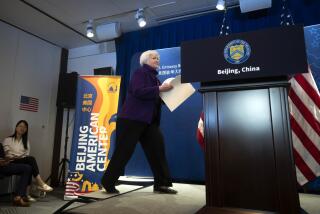Huawei without Google: Does the Chinese telecom giant have a backup plan?

Huawei Technologies Co. is China’s largest telecommunications company.
Life without Google is normal in China. Some 1.4 billion Chinese people wake up each day to check WeChat instead of Gmail, navigate with Baidu instead of Google Maps, and watch videos on Youku instead of YouTube.
But will the rest of the world want to buy phones that use only these Chinese alternatives?
For the record:
9:20 p.m. May 20, 2019An earlier version of this report said the Trump administration moved to raise tariffs on $200 million in Chinese goods. The correct amount is $200 billion.
Under a Trump administration blacklist, Huawei will have to either persuade consumers to do that, or scale down and limit itself to the Chinese market.
On Sunday, Google suspended business with the Chinese telecommunications giant, following two executive orders President Trump signed last week. Those orders ban U.S. purchase of technology from companies deemed a threat to national security and block Huawei from buying American products without U.S. government approval.
That means Huawei would be cut off from crucial hardware such as chips, processors and modems from Qualcomm, Intel and other American companies.
Unless the ban is dropped as part of ongoing U.S.-China trade talks, Huawei could end up leading a “decoupling” of the American and Chinese tech worlds that encompasses everything from supply chains to the end user’s choice of apps.
Huawei founder and CEO Ren Zhengfei scoffed at the orders on Saturday, telling Japanese media in Shenzhen, China, that the company would be “fine” without U.S. components.
“We have already been preparing for this,” Ren said.
Huawei reportedly has a stockpile of enough chips to keep the company going for several months. Its subsidiary HiSilicon also designs and supplies chips for Huawei smartphones, though industry experts say their chips are not on par with American ones.
HiSilicon President He Tingbo wrote a letter to her staff on May 17 saying the firm has been developing back-up chips for years in case an “extreme scenario” like this one unfolded, and would help enable Huawei to be self-sufficient.
Huawei is not a major customer for San Diego-based Qualcomm, which supplies 50% of the global market for smartphone processors. Analysts believe the smartphone chips that Qualcomm sells to Huawei are limited to a few models sold outside China. Huawei does license Qualcomm’s cellular patents, but the two companies are in a dispute over how much is owed in patent fees. Investors worry that Huawei could stop making payments.
A lack of U.S. components for Huawei network gear could slow its rollout of 5G cellular service, which is important for Qualcomm. “The longer-term impact is Huawei is important for 5G infrastructure networks, and if they’re unable to ship, 5G could really grind to a halt,” said Mike Walkley, an analyst with Canaccord Genuity.
Huawei’s phones run on Android and include the Google Play set of apps in devices sold abroad. Most Google apps are not available on models sold in China, where they are illegal.
Huawei will still have access to the open source version of Android’s operating system, but Google will not provide access or technical support on its proprietary apps and services, the company said.
Google reassured Huawei users on Twitter on Monday that existing phones would retain access to Google Play. But future phones will lose access to the Google Play store, apps such as Gmail and YouTube, and updates to the Android operating system.
Trump’s new chokehold on Huawei threatens the telecom firm and U.S.-China trade talks »
Google did not respond to questions about how it would keep existing Huawei phones’ access to Google services. “We are complying with the [Trump administration] order and reviewing the implications,” the company said in a written statement.
Huawei is the world’s second-largest smartphone seller, ahead of Apple and behind Samsung. It accounts for about a third of the European smartphone market, but is lesser known in the U.S. market because carriers such as AT&T and Verizon don’t sell Huawei devices.
“They were en route to become the biggest smartphone seller in Europe, and not just in Europe but worldwide,” said Francisco Jeronimo, London-based associated vice president of IDC, a global market intelligence firm.
The ban completely changes the picture, he said. “Without access to Google services it’s nearly impossible for them to sell smartphones outside China.”
If Google does not get a U.S. license to sell to Huawei, the Chinese company would struggle to sell its phones outside China and mobile carriers might stop selling Huawei phones, hampering Huawei’s international expansion, he added.
But if Google lost the Huawei market — and potentially that of other Chinese players — it would also threaten Android’s global business.
Elliott Zaagman, co-host of the China Tech Investor podcast, said the ban would hurt both Huawei and American businesses.
Huawei bought $70 billion worth of components for its products last year, including $11 billion from U.S. businesses.
Zaagman said that “$11 billion is a lot of money and hurts a lot of big American companies as well. You’ve got to believe that a lot of lobbyists are in Washington trying to find loopholes to this ban.”
Huawei has been in conflict with the U.S. since last year, when chief financial officer Meng Wanzhou was arrested in Canada at the request of the U.S. on charges of financial fraud.
Washington has pressured allied governments to ban Huawei equipment over cybersecurity concerns, particularly that the Chinese government will be able to access and control key infrastructure through 5G networks built by Huawei.
Huawei denies accusations that the company has engaged in activities threatening U.S. national security.
In China, state and public support for Huawei have grown amid an escalating U.S.-China trade war, including the Trump administration’s recent move to increase tariffs on $200 billion in Chinese goods from 10% to 25%.
Beijing has criticized U.S. government actions against Huawei as politically motivated.
“China supports Chinese companies defending their legitimate rights according to laws,” Chinese Ministry of Foreign Affairs spokesperson Lu Kang said at a news conference Monday.
“In terms of what measures either Chinese companies or Chinese government would take, please wait and see,” he said.
The day after Trump’s executive orders, China officially arrested two Canadians — a former diplomat and a businessman — who had been in custody since December, when they were detained shortly after Meng’s arrest in Canada. China has accused both of espionage.
Huawei has been developing its own operating system, but company spokespeople said as recently as last week that it preferred to use Android.
If no exceptions to the ban are given, however, Huawei and other Chinese companies may move toward developing an alternative operating system and ecosystem of apps for their phones sold abroad.
Huawei did not respond to specific questions about how the company would move forward. Huawei will provide security updates and after-sales services to all existing Huawei products, the company said in a written statement.
“We will continue to build a safe and sustainable software ecosystem, in order to provide the best experience for all users globally,” the statement said.
The idea of a smartphone with no Google may sound absurd to Western consumers.
But China already has 43% of the global smartphone market — significant power, according to Jeronimo.
He predicted that even if the trade war ends and bans on Huawei are withdrawn, Chinese technology companies would build an alternative operating system within the next five years, so that they can rely less on unstable foreign supply chains.
“It’s very likely that the biggest Chinese makers, Huawei, Xiaomi, Oppo, Lenovo, they will work with the Chinese government to build an alternative to Android,” he said. “This would completely change the smartphone market and would open the door for other alternatives to come up either in China or Europe or somewhere else.”
Times staff writer Robyn Dixon in Taipei, Taiwan, and San Diego Union-Tribune staff writer Mike Freeman in San Diego contributed to this report.
More to Read
Start your day right
Sign up for Essential California for news, features and recommendations from the L.A. Times and beyond in your inbox six days a week.
You may occasionally receive promotional content from the Los Angeles Times.







